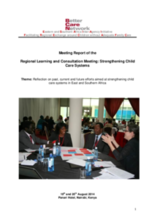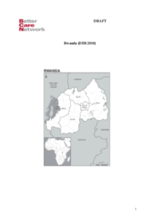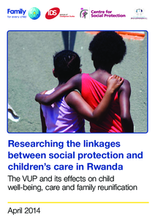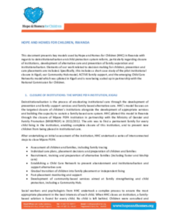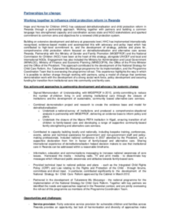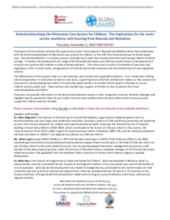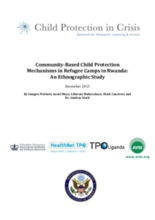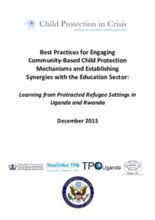This country page features an interactive, icon-based data dashboard providing a national-level overview of the status of children’s care and care reform efforts (a “Country Care Snapshot”), along with a list of resources and organizations in the country.
demographic_data
childrens_living_arrangement
children_living_without_bio
adoption
social_work_force
key_stakeholders
Key Stakeholders
Add New DataOther Relevant Reforms
Add New Datadrivers_of_institutionalisation
Drivers of Institutionaliziation
Add New Datakey_research_and_information
Key Data Sources
Add New DataReport on National Assessment of Centres caring for Children with Disabilities in Rwanda
National Integrated Child Rights Policy
Country Care Review: Rwanda
Prevalence and number of children living in institutional care: global, regional, and country estimates
The Way Forward Project Report
Community-Based Child Protection Mechanisms in Refugee Camps in Rwanda: An Ethnographic Study
Displaying 141 - 150 of 188
Following a consultative mapping, a regional learning meeting took place on 19-20 August 2014 in Nairobi, Kenya. The theme of this meeting was "Reflection on past, current and future efforts aimed at strengthening child care systems in East and Southern Africa."
This report from Better Care Network is a collection of care-relevant data and demographic information on Rwanda from the Demographic and Health Surveys (DHS) Program.
This report features the results of, and recommendations based on, a study conducted in Rwanda which investigates the links between the cash transfer program “Vision 2020 Umurenge Programme (VUP),” child well-being, and children’s care and family reunification.
This study by UNICEF sought to identify key determinants of vulnerability among children –including those affected by HIV and AIDS – that can contribute to developing an improved global measure of vulnerable children in the context of HIV and AIDS. Data from the most recent available household surveys at the time of analysis was used from 11 countries – Cambodia, Central African Republic, Haiti, Malawi, Rwanda, Sierra Leone, Swaziland, Uganda, United Republic of Tanzania, Zambia and Zimbabwe – were pooled.
This document presents key models used by Hope and Homes for Children (HHC) in Rwanda with regards to deinstitutionalisation and child protection system reform, particularly regarding closure of institutions, development of alternative care and prevention of family separation and institutionalisation.
A short brief by Hope and Homes for Children (HHC) in Rwanda explaining strategies used in the process of taking its deinstitutionalisation pilot project and research up to policy-level advocacy.
This publication, produced by the Parenting in Africa Network (PAN), highlights the skillful parenting practices of several pastoral communities in Africa.
Webinar co-hosted by Better Care Network and the Global Social Service Workforce Alliance on Deinstitutionalizing the Alternative Care System for Children: The implications for the social service workforce with learning from Rwanda and Moldova.
The purpose of this research is to learn about community-based child protection processes and mechanisms in two refugee camps in Rwanda – Gihembe and Kiziba.
The aim of this note is to outline some ways of engaging with community-based child protection mechanisms (CBCPMs), especially within the education sector, which apply in both urban and rural protracted refugee settings.

